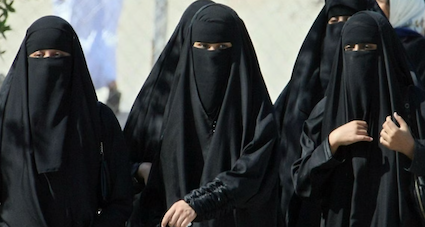Saudi Arabia has banned the abaya from examination halls even as students in India continue to stage walkouts from exam halls for not being allowed to wear Hijab, says a Swarajyamag report.
Abaya, widely worn by women in Saudi, is a loose cloak worn over the dress to hide the figure and is accompanied by a scarf covering the hair, shoulders and neck and often the mouth, much like the ‘burqa’ common among Muslims in India, Pakistan and Bangladesh.
In Saudi and some other Islamic countries, this cloak, however, is mandatory clothing for women in public by law. These countries include Iran, which has been witnessing a massive protest against this mandate since September.
In 2018, Saudi’s young Prince Mohammed Bin Salman attracted international attention when he said that as long as the dress worn by women in public is “decent and respectful”, Abaya is not mandatory.
As per a report by The National, an English language newspaper published from Abu Dhabi, the Saudi Education and Training Evaluation Commission recently announced that students would not be allowed to wear Abaya in exam halls.
The Commission, which is responsible for accrediting educational and training systems, said that all students must wear the uniform.
Saudi Arabia is home to the cities of Mecca and Medina, centres of the Islamic faith where Muslims from all parts of the world congregate for pilgrimages.
This announcement comes at a time when some Muslim organisations in India have termed similar action taken by school authorities as Islamophobic.
In April, when the board exams for students of second pre-university college (PCU) in Karnataka – equivalent of Class 12 – started, the institutes turned away students who refused to remove their hijab.
Before the exams started, Karnataka Education Minister BC Nagesh had announced that hijab would not be allowed during the exams. He said that everyone should follow the High Court (HC) verdict.
Reports said that those turned away included two students who had earlier moved the Karnataka High Court asking special privileges for Muslim women to wear hijab in educational campuses, arguing that “hijab is an essential religious practice in Islam”.
The HC, after several hearings, dismissed the pleas and upheld the state government’s right to enforce uniform equally on all students, saying that petitioners could not establish hijab as essential religious practice in Islam.
At least two other petitioners did not turn up for exams at all in protest of the court verdict.
Islamists, Communists and self-identified “liberal” commentators on social media, at that time, criticised (see some posts here, here and here) the institutes for not allowing the students to sit for exam in hijab.
In October, a similar controversy, though on a lesser scale, erupted in a college in Bihar, where women students began protesting against the college management saying they were discriminated on the basis of their religion, as a teacher had asked them to remove the hijab.
The teacher and the principal said in their defence, that the institute was only checking for bluetooth devices to prevent cheating during exam.
A student, incidentally from the Muslim community, later told the media that her fellow students had turned the simple issue of checking of examination-related checking into a communal issue.
She said, “They started citing religion and all that. I wonder where does their religion go when they attend a function? How come they remember their religion only during exams? It it because of girls like these that people start questioning the religion itself.”


